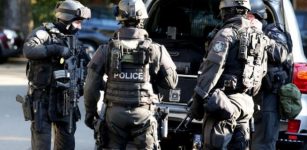Police Who Pre-Emptively Kill Suspected Terrorists Will Be Protected

The NSW government is set to introduce new laws by the end of this month which give police immunity for pre-emptively shooting a person they suspect of terrorism, even if that person does not pose an imminent threat to others.
NSW Premier Gladys Berejiklian announced that she will support all 45 of the recommendations from the coronial inquest report into the Lindt Café siege, and will prioritise those which give police more powers and protect them from civil and criminal prosecution.
New South Wales Police Commissioner Mick Fuller acknowledged that police already have the power to “shoot-to-kill” people they suspect of terrorism in situations analogous to the recent London attacks – where they pose an imminent threat to public safety.
However, he feels that situations like the Lindt Cafe siege are a grey area, as it was unclear whether Man Haron Monis was going to act upon his threats.
As it turned out, Monis was later categorised as a “deranged gunman” suffering from “mental health problems” who was not affiliated with any particular group, whether terrorist or otherwise.
Under the proposed legislation, police would be authorised to “shoot-to-kill” suspected participants once the commissioner declared an event to be a “terrorist incident”, regardless of whether those suspected of involvement pose an imminent threat to others.
Criticism
Critics point out that the proposed legislation confers virtually unfettered power on the police commissioner to determine whether an event constitutes a “terrorist incident”, and therefore when his colleagues will be protected from prosecution for wounding or killing people.
They are concerned he will declare such events “all too readily” in the interests of protecting police, thereby increasing the likelihood of police unnecessarily shooting and killing people. Critics are concerned that “rogue” police officers who carelessly shoot people will be protected, even if it turns out that their targets were completely innocent of any crime, and/or the shooting was not justified.
There are also fears that the legislation will cause the escalation of situations which could be kept under control and ultimately defused, again potentially leading to the loss of innocent lives.
There are additional concerns about the commissioner’s ability to identify whether a situation constitutes a “terrorist event”, with critics arguing that current laws which require an imminent risk to persons or the public representing a more appropriate mechanism for determining whether a particular individual should be shot or killed.
Shoot first and ask question later
New South Wales police are already being trained in specialised tactics based on a ‘confront and neutralise’ policy, and have access to semi-automatic weapons to act in order to protect themselves and members of the public.
The question, then, is whether the proposed legislation – which gives the minister significant powers, allows for the “pre-emptive” killing of suspects and protects rogue and careless police officers from prosecution – is really a good idea.








